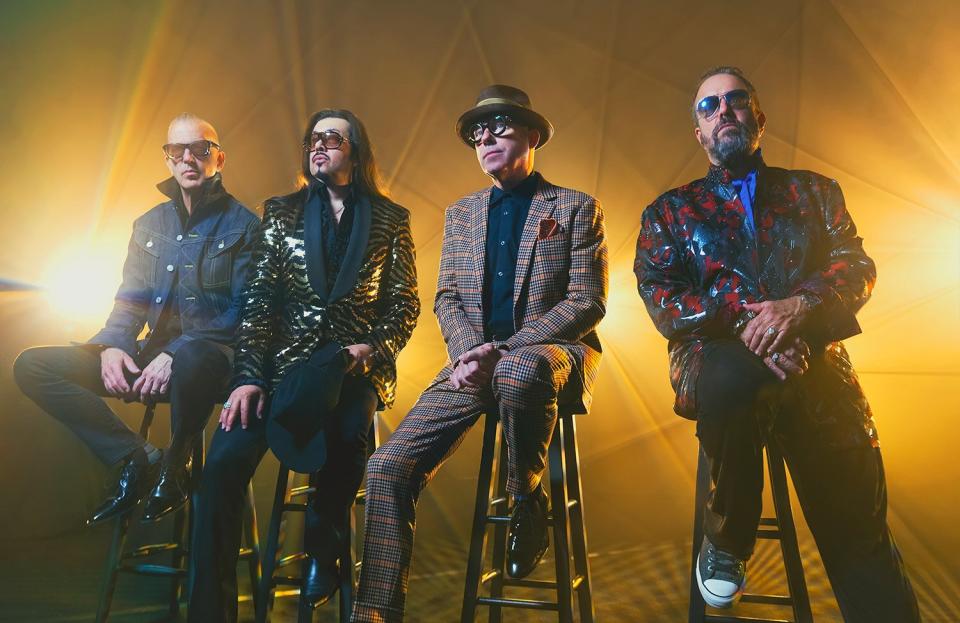The Mavericks' Raúl Malo Says His Latinidad Is a 'Big Part of What We Are' as a Band
- Oops!Something went wrong.Please try again later.
Latinx people in country music? It's a rarity, but it's artists like Raúl Malo and The Mavericks who've blazed trails for Latinx people in the industry.
Chatting with PEOPLE off the heels of The Maverick's trailblazer award at the Americana Music Awards and amid Latinx Heritage Month, Malo shares the importance of his Latinx identity in the group's music and the hoops they've had to jump through to make their mark. The 56-year-old also talks about the group's all-Spanish album, aptly named En Español.
"We always kid around that you can take the boy out of Miami but you can't take the Miami out of the boy," Malo, who's Cuban, tells PEOPLE with a laugh. "Our culture, it's a strong one."
One of the group's first major tracks, titled "From Hell to Paradise," spoke on the struggles of Cuban immigrants in leaving their home for this country. (The Mavericks are currently comprised of Malo, Eddie Perez, Jerry Dale McFadden and Paul Deakin.)

Alejandro Menéndez Vega The Mavericks
RELATED: Get to Know PEOPLE's 10 Favorite Up and Coming Latinx Musical Acts
"It was my aunt's story," Malo says. "Coming from an immigrant family, you appreciate this country in a really deep patriotic way because of what immigrants have to go through to get here and to stay here..."
"This country is an amazing country still, even with all its problems and all its divisions, but that fight, that will to improve, to better your life, to fight for what's yours, to be successful and grab a slice of the pie, that's what I'm most proud of about my Latin heritage," Malo adds.
Growing up in Florida, Malo says he saw firsthand what first-generation immigrants had to struggle to provide for their children. "Latinos across the board are some of the hardest working people on the planet," says Malo.
And Malo is also a symbol of that resilience as an artist who has made his name as a Latinx person in a white-centric genre.
RELATED: Becky G on How Tequila, Her Latinx Roots and Mom Alejandra Inspired Her New Makeup Collection
"It was challenging, don't get me wrong," he admits. "For starters, half of the radio announcers could barely say my name. And so just that alone was challenging, but I think, musically, there have been challenges, for sure."
Malo says the group released a song with Flaco Jiménez titled "All You Ever Do Is Bring Me Down," which featured an accordion solo. The song's Latin sounds did not go over well with radio DJs and they got some negative feedback.
"I remember getting a call from the radio promoter at the record label saying that there was a radio station in North Carolina that wouldn't play the song because of the accordion," he says. "I remember being so distraught and hurt by that, like who the F is this guy? Telling me that I can't put an accordion solo. It hasn't always been easy."
RELATED VIDEO: Ricky Martin Doesn't Want To Hide Who He Is Anymore: 'I Am a Man with No Secrets'
But things have definitely changed since then. "Now, it's funny. Now, country music has horns, they're singing with accordions, they're doing duets with hip-hop artists. It's a whole different thing now, but I remember that phone call and I realized at some point that country music was not going to be conducive to what we wanted to do," he adds. "And so, little by little, we've strayed from the head and have carved our own path and now we're in no man's land."
Although the group's music has always had a Latin flair, it wasn't until last year that they delved completely into Spanish music when they dropped En Espa˜ñol, featuring several original songs and other iconic covers.
"'Me Olvide de Vivir' is one of my favorite tracks on there — it's a beautiful old song that Julio Iglesias had a big hit with and it was my grandad's favorite song," says Malo. "And then the originals, I love 'Suspiro Azul' — that has such that sort of low rider swing that I could just see my friends in East L.A. or in Austin in their hot rods, playing that one."
As he looks forward to the future of the group, Malo says he hopes to be remembered as "a guy who whenever he stepped on stage, he gave it his all."
"That's our motto as a group," he adds. "Everybody lives to serve the groove and I think that's my favorite thing about the band and how we work."

